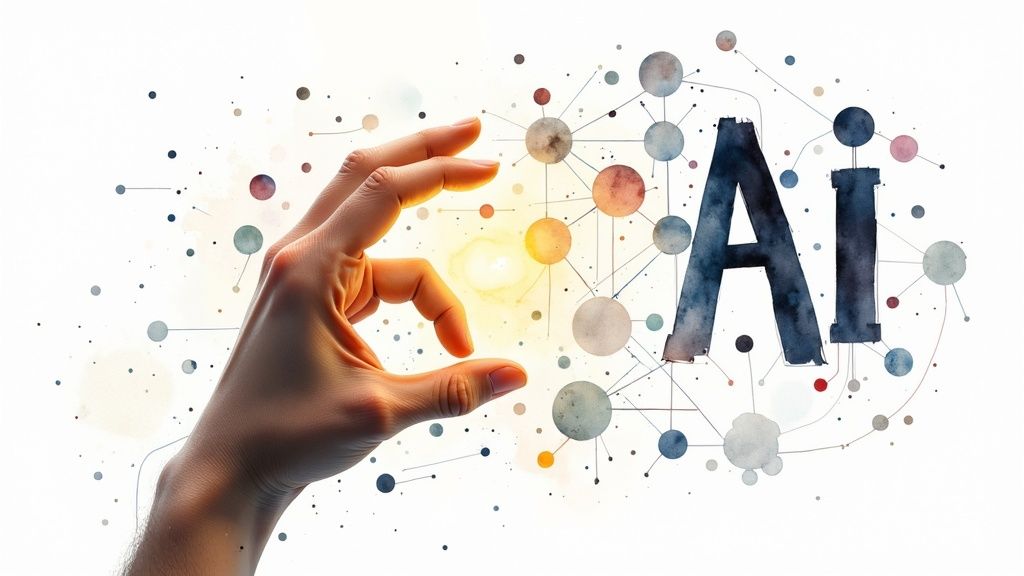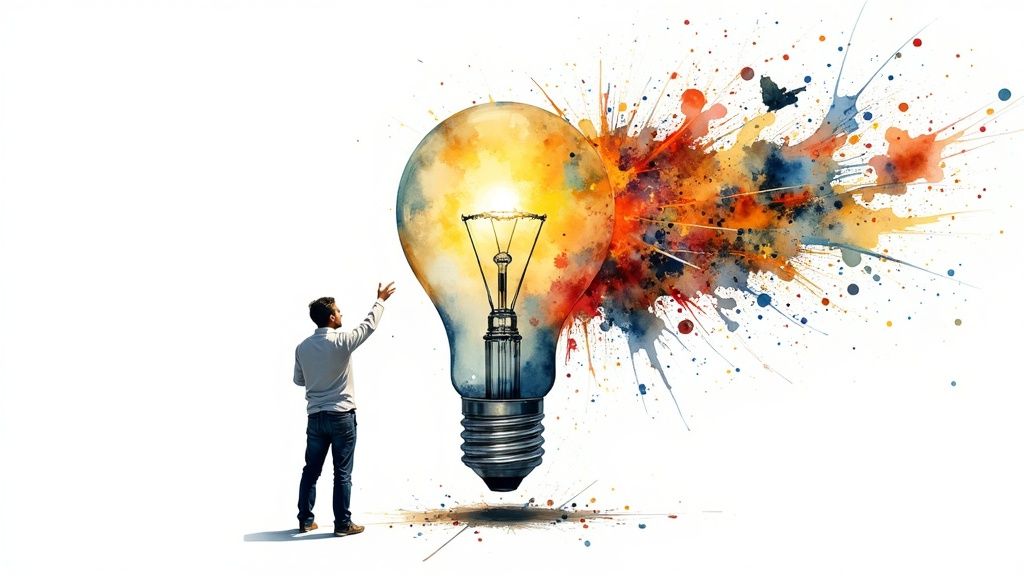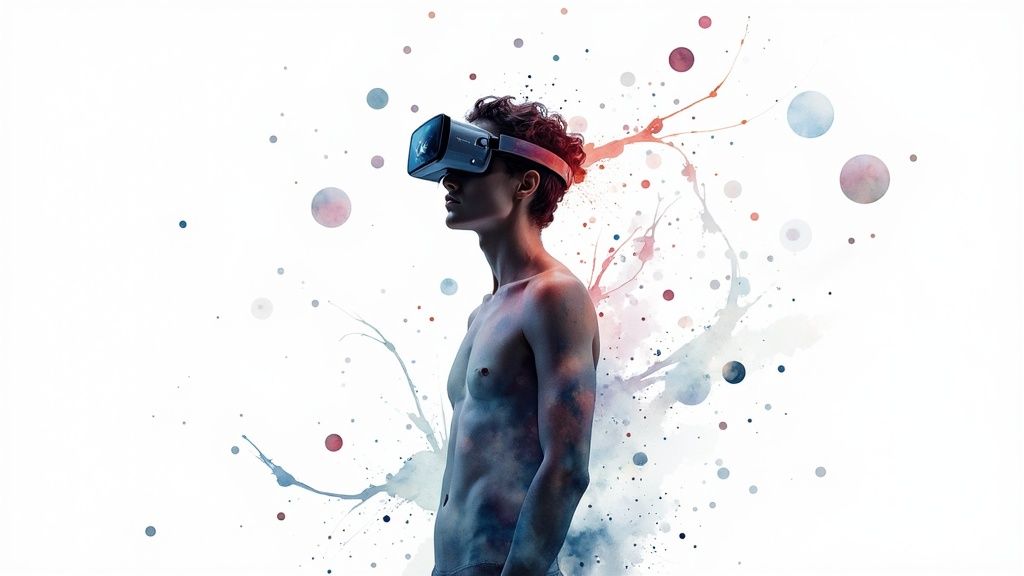Introduction: Understanding AI Content Creation

The content creation landscape is constantly changing, and artificial intelligence (AI) is at the forefront of this evolution. Once a futuristic concept, AI content creation is now a practical tool for businesses and individuals seeking to improve their content strategies. Specifically, AI is changing how we write, from generating initial ideas to refining and polishing existing content. This shift is a response to the growing demand for high-quality, engaging content and the need for more efficient creation processes. Therefore, understanding this evolving landscape is important for anyone involved in content marketing.
How AI Is Changing the Content Game
AI content creation tools use algorithms and machine learning to assist with different parts of the content creation process. For instance, AI can generate topic ideas, create outlines, write various types of copy, and even optimize content for search engines. This means marketers can automate time-consuming tasks, freeing them to focus on broader strategic initiatives. Furthermore, AI can analyze large amounts of data to understand audience preferences and current trends, resulting in more targeted and effective content. This data-driven approach ensures that content resonates with the intended audience, improving engagement and conversions. Importantly, these advancements are already impacting businesses of all sizes.
The Growing Importance of AI in Content Creation
The increasing use of AI in content creation is more than a fleeting trend; it marks a significant shift in the industry. Many marketers recognize AI's potential to improve content quality, boost efficiency, and ultimately, drive better results. For example, using AI for content creation gives businesses a competitive edge, allowing them to produce more content faster without sacrificing quality. This speed and efficiency is especially important in today’s fast-paced digital environment. Moreover, AI helps maintain consistent brand voice and messaging across all content, a vital factor in building a strong brand identity. The combination of efficiency, quality, and consistency makes AI an increasingly valuable tool for today's content creators. As AI technology continues to advance, its role in content creation will only grow, making it crucial for businesses to adapt and integrate these tools into their workflows.
Types of AI Content Creation Tools
As AI continues to reshape content creation, a wide variety of tools has emerged, each designed for specific needs and offering unique features. Understanding these different types of AI content creation tools is vital for using AI effectively and maximizing your content strategy. It's not simply about staying up-to-date; it's about selecting the right tool for the task and integrating it seamlessly into your workflow.
AI Writing Assistants
Like a helpful partner, AI writing assistants are designed to improve your writing process. These tools offer features like grammar and style checks, tone adjustments, and even content generation based on your input. For instance, an AI writing assistant can help you rephrase a sentence for clarity, suggest stronger verbs, or even create entire paragraphs on a given topic. This can greatly speed up writing and improve overall content quality. What's more, these tools are constantly learning and improving, making them even more valuable for content creators.
AI-Powered Content Generators
Taking automation further, AI-powered content generators can create various content formats, such as blog posts, social media updates, and marketing copy. These tools are particularly helpful for generating high volumes of content quickly. Imagine needing several social media captions for a single product launch. An AI content generator can create these in minutes, saving you significant time and effort. Plus, some content generators offer SEO optimization features, making your content more easily discoverable by search engines. This makes AI content creation not only efficient but also effective for attracting organic traffic.
AI Image and Video Generators
Visual content is key for grabbing attention and engaging audiences. AI image and video generators are becoming powerful tools for creating compelling visuals without requiring advanced design skills. As an example, you can provide a text description of the image you want, and the AI will generate several options based on your description. AI video generators can similarly create short video clips from text or transform static images into animations. This increased access to high-quality visuals makes content creation more accessible, enabling even small businesses to produce professional-looking content.
These different AI tools each play a vital role in streamlining and improving content creation. Choosing the right tool depends on your particular requirements, whether you need to improve your writing, generate large amounts of content, or create engaging visuals. Understanding the strengths and weaknesses of each type of AI tool helps you use them to elevate your content strategy and achieve your marketing goals. As AI continues to develop, we can expect even more advanced and specialized tools, further changing how we create and consume content.
Benefits of AI in Content Creation

Now that we've explored the various types of AI content creation tools, it's worth considering how using AI can benefit your content strategy. The advantages are numerous and impact many areas of the content lifecycle, from initial ideas and creation to optimization and distribution. These benefits aren't just about speed; they're about working smarter and more effectively.
Enhanced Efficiency and Productivity
One of the biggest advantages of using AI for content creation is the significant improvement in efficiency and productivity. Think of AI as a tireless assistant that can handle tedious tasks, freeing you to focus on creative and strategic aspects. For instance, AI tools can quickly generate outlines, suggest keywords, and even draft entire articles, saving you hours of work. This increased efficiency lets creators produce more content in less time, a crucial advantage in today's demanding content world. This efficiency also leads to cost savings, particularly for businesses with high content demands.
Improved Content Quality and Consistency
AI not only creates content quickly but also helps improve its quality and consistency. AI writing assistants, for example, can analyze your writing for grammar errors, style inconsistencies, and even plagiarism, ensuring a higher level of polish. This is like having a dedicated editor constantly reviewing your work. Moreover, using AI for content creation can help maintain a consistent brand voice across all platforms. This consistency is vital for building a strong brand identity and audience trust. Imagine all your content, regardless of the author, resonating with the same distinct voice.
Data-Driven Content Optimization
AI is adept at analyzing large datasets, which is incredibly valuable for optimizing your content strategy. By using AI-powered analytics tools, you gain deep insights into audience behavior, content performance, and keyword trends. As an example, AI can identify which topics resonate with your target audience, which keywords drive traffic, and which content formats perform best on different platforms. This data empowers you to make informed decisions about your content strategy, ensuring your efforts align with audience preferences and business goals. This targeted approach can dramatically improve engagement, conversions, and, ultimately, your return on investment.
Enhanced Creativity and Ideation
While some worry AI will stifle creativity, it can actually be a powerful tool for generating new ideas and exploring different creative avenues. AI content generators can suggest unique angles for familiar topics, offer different phrasing for headlines, and even generate story concepts. This is not about replacing human creativity; it't about enhancing it. Think of AI as a brainstorming partner that helps you overcome creative blocks and find fresh perspectives. By using AI in this way, you can unlock new possibilities and produce more engaging and innovative content. This can be especially helpful with complex or unfamiliar subjects, allowing you to quickly generate initial ideas and build a foundation for your creative process. Combining the power of AI with human creativity creates a synergistic approach that maximizes both efficiency and innovation.
Best Practices for AI Content Creation
Building on the benefits of using AI, let's discuss best practices that will help you maximize the effectiveness of these tools. These guidelines are practical steps you can implement to improve your content strategy. This approach ensures you're not just using AI, but using it effectively.
Defining Clear Objectives and Target Audience
As with any content creation project, using AI should start with a clear understanding of your goals. What do you hope to achieve with your content? Are you focused on driving traffic, generating leads, or building brand awareness? Clearly defined objectives will guide your AI tool selection and how you guide the AI. If your goal is lead generation, you might choose a tool specializing in compelling calls to action. Understanding your target audience is also essential. AI can tailor content to specific demographics and interests, but only if you provide the relevant information. Knowing your audience's preferences helps you guide the AI to create content that resonates with them, resulting in more effective and engaging material. This foundational understanding of goals and audience is the cornerstone of a successful AI content strategy.
Crafting Effective Prompts and Inputs
Think of AI as a highly skilled apprentice needing clear instructions to produce the best results. Crafting effective prompts is essential for guiding the AI and ensuring the content aligns with your objectives. This means providing specific details about the desired tone, style, and topic. For instance, instead of asking for a general blog post about “dogs,” you might ask for “a humorous blog post about the challenges of owning a golden retriever puppy.” The more specific your prompt, the more targeted and relevant the AI's output will be. Providing high-quality input data is equally important. If you're training an AI model on your existing content, ensure it reflects the quality and style you want the AI to emulate. Like a chef needs fresh ingredients for a delicious meal, AI needs good data to produce engaging content.
Maintaining Human Oversight and Editorial Control
While AI can automate many aspects of content creation, human oversight is still crucial. AI tools are powerful, but they're not perfect. They can sometimes produce content that is factually incorrect, stylistically awkward, or even inappropriate. Therefore, it's important to review and edit all AI-generated content carefully. Think of AI as a first-draft tool, providing a solid base that you then refine and polish. This editing process ensures accuracy, maintains quality, and adds the human touch that makes content truly connect with audiences. This collaborative approach, combining AI's strengths with human creativity and critical thinking, is key to maximizing AI's potential. This synergy ensures the final product not only meets your objectives but also reflects your brand's unique voice and values. Furthermore, continuous monitoring and refinement are important. As you gain experience using AI, analyze the results and adjust your prompts and workflows as needed. This iterative process ensures ongoing improvement and helps you stay ahead in the ever-changing world of AI-powered content creation.
Common Challenges and Solutions

While AI content creation offers numerous benefits, it's important to recognize the potential challenges. Understanding these obstacles is the first step to finding effective solutions and maximizing the benefits of AI. Addressing these challenges directly will ensure smoother and more successful AI integration.
Maintaining Authenticity and Avoiding Generic Content
One common concern is the risk of AI-generated content sounding robotic or lacking a genuine human touch. This is particularly important when aiming for an emotional connection with your audience. However, this challenge can be overcome by carefully crafting prompts and providing examples of your desired tone and style. Think of it like giving an artist a detailed brief: the more specific the instructions, the more likely the desired result. Human review and editing are also essential for adding those nuanced touches that make content truly resonate with readers. This ensures the final product retains a human feel while benefiting from AI's efficiency.
Ensuring Accuracy and Fact-Checking AI Output
Another potential issue is the tendency of some AI tools to generate inaccurate information or fabricate details. This highlights the importance of thorough fact-checking and verification of all AI-generated content. Just as you wouldn't publish a research paper without verifying sources, you shouldn't publish AI-generated content without careful review. Using AI-powered fact-checking tools can streamline this process, but human oversight remains vital. This ensures the presented information is accurate and maintains your credibility with your audience. This rigorous fact-checking builds trust and establishes you as a reliable information source.
Addressing Ethical Considerations and Plagiarism
Using AI for content creation also raises ethical questions, especially regarding plagiarism and copyright infringement. It’s vital to ensure your AI-generated content is original and doesn't unintentionally copy existing work. Plagiarism detection tools can help identify potential problems and maintain ethical standards. Understanding the terms of service of your AI tools is also crucial for compliance and avoiding legal issues. By taking these proactive steps, you can use AI ethically and responsibly, protecting your reputation and your content's integrity. This approach not only reduces risks but also fosters a culture of responsible AI use.
By proactively addressing these challenges, content creators can confidently integrate AI into their workflows, leveraging its power while mitigating potential drawbacks. This balanced approach allows you to maximize AI's benefits while maintaining the essential elements of human creativity and critical thinking. The goal is to create a synergy between humans and AI, where each complements the other's strengths for optimal results. This collaboration is key to unlocking AI's full potential in content creation and shaping the future of content marketing.
Future of AI in Content Creation

Having explored the current state of AI in content creation, let's consider its future trajectory. This dynamic and ever-evolving field holds exciting possibilities for content creators. AI is set to become even more sophisticated and integrated into our workflows, changing how we approach content strategy and execution.
Hyper-Personalization and Dynamic Content
One significant trend is toward hyper-personalization. AI already allows marketers to tailor content to specific demographics, but the future promises truly individualized content experiences. Imagine websites that dynamically adjust their content based on a user’s past behavior, preferences, and even real-time context. This level of personalization will create more engaging and relevant experiences, building stronger connections with audiences. This means AI will move beyond simply adding a user’s name to an email and toward creating completely unique content journeys for each individual.
AI-Powered Content Strategy and Optimization
Beyond content creation itself, AI will play a growing role in shaping content strategy. AI tools can analyze massive amounts of data to identify emerging trends, predict content performance, and even suggest optimal content formats for different platforms. This means using AI will become more strategic, enabling marketers to anticipate audience needs and optimize content for maximum impact. This data-driven approach will shift the focus from reactive content creation to proactive planning, ensuring content remains relevant and effective in a constantly changing digital environment.
The Rise of Human-AI Collaboration
The future of AI in content creation isn't about replacing human creativity but about enhancing it. The most effective approach will involve a symbiotic relationship between humans and AI, each leveraging their respective strengths. AI can handle tedious and repetitive tasks, such as generating initial drafts and optimizing for keywords, while humans focus on creative elements, such as crafting compelling narratives and adding emotional depth. This collaborative model maximizes both efficiency and creativity, producing content that is both engaging and impactful. This partnership ensures the human touch remains central to content creation, while AI amplifies its reach and effectiveness. Ultimately, using AI will empower human creators to push creative boundaries, exploring new formats, styles, and approaches to storytelling.
Conclusion
Using AI for content creation is no longer a vision of the future but a present reality reshaping the marketing world. Throughout this post, we've examined the transformative power of AI, from generating first drafts to optimizing content for specific audiences. This shift towards AI-driven content creation offers remarkable opportunities for efficiency, scale, and personalization.
Key Takeaways and Actionable Insights
-
Diverse AI Tools: The availability of various AI content creation tools, like writing assistants, content generators, and image/video generators, gives marketers a diverse toolkit for specific needs. Whether you need help writing compelling copy or creating visuals, there’s an AI tool to assist.
-
Enhanced Efficiency: AI empowers content creators to produce more high-quality content in less time, resulting in cost savings and increased productivity. Imagine automating the creation of social media captions, freeing your team for strategic work.
-
Data-Driven Optimization: AI excels at analyzing data to provide valuable insights into audience behavior and content performance. This allows marketers to refine their strategies, personalize content, and maximize ROI. Using AI isn't just about generating content; it's about understanding what works for your audience and optimizing accordingly.
-
Human-AI Collaboration: The future of content creation lies in a synergistic partnership between humans and AI. While AI automates repetitive tasks, human creativity and critical thinking are still essential for authenticity, accuracy, and emotional impact. This balanced approach combines the strengths of both to create exceptional content.
Integrating AI in content creation presents both opportunities and challenges. While concerns about authenticity and ethical considerations are valid, they can be addressed through careful planning, human oversight, and a commitment to responsible AI use. By embracing best practices and proactively addressing potential issues, businesses can confidently use AI's power to elevate their content strategies and achieve their marketing goals.
Ready to transform your content creation and unlock AI's full potential? Explore Next Craft today and discover how our premium AI-enhanced marketing services can help you achieve unprecedented results. https://www.nextcraft.work/